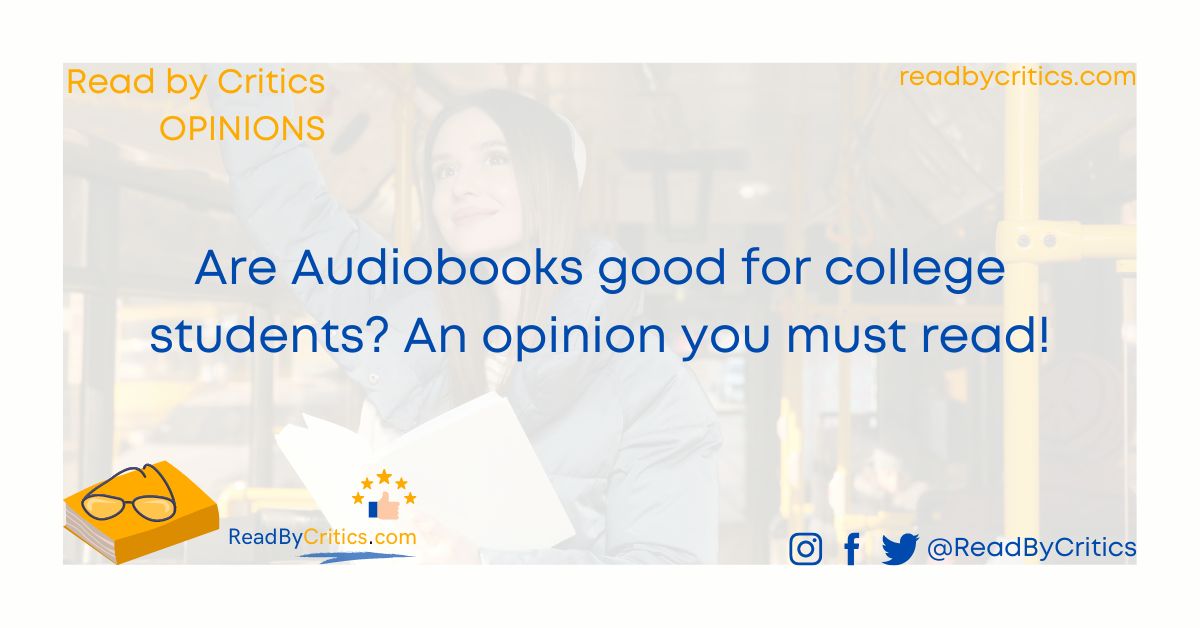Songs, movies, podcasts, documentaries, and much more including gaming have gone online. Sitting in the comfort of your home or enjoying a vacation abroad, you can easily get your hands on the content of your choice. All you need is the internet! However, have you ever thought about what could a student do to manage his or her studies well while on vacation? Carrying books everywhere you go cannot be a good option. Moreover, doing everything on Kindle may also be a challenging notion. We just cannot concentrate on the screen of a Kindle reader, a mobile phone or tablet, or even a laptop screen while enjoying the sceneries or having fun with friends around a bonfire on a chilly winter night. Can audiobooks come into play in these circumstances? One might say why not! We just need to plug in earphones, touch the play button, and done; listen to our textbooks or any other book we want while doing anything else we have to. Sounds convenient? Yes, but it might be catchy too. We need to understand the usefulness and limitation of audiobooks for students (college students in this article).
As an assistant professor of literature, I am often approached by my students seeking advice on the best ways to engage with course materials. Back in the days of traditional content consumption, the best advice would have been to read the textbooks. Reading again. And continue reading. With the introduction of YouTube, students started seeking help and support from there. However, these days, one question that frequently arises is whether audiobooks are a viable option for college students. In today’s article, I will share my opinion about the same.
Audiobooks can indeed be a valuable tool for college students, particularly those who are juggling multiple responsibilities and find themselves short on time. Part-timers, interns, or students who have some creative roles to play along with their studies, may be the best candidates who may have concerns about audiobooks. The auditory medium of audiobooks allows students to enjoy listening to their textbooks while carrying out other tasks, such as commuting, exercising, or doing household chores. Needless to say, part-timers can also enjoy this part. This multitasking potential makes audiobooks an appealing choice, enabling students to optimise their time management skills effectively. At times, audiobooks can emphatically enhance the learning experience for students who struggle with traditional text-based reading. Well, it is also important to pick up books narrated by quality narrators with some experience in the field. Listening to a skilled narrator bring characters to life, infuse emotions into the prose, and convey the subtleties of the written word can aid in comprehension and appreciation of complex literary works. The same stands true about textbooks and academic books. A skilled narrator, a professor with creative skills or someone who knows the text as well as has the best contexts to subtly fuse the best possible examples in the course of narration to make the experiences rich enough to offer the listeners, students in this case, the best learning opportunities without being bored. The auditory aspect adds an extra layer of sensory engagement, making the content more vivid and memorable. And it is true, guys. If you listen to something a few times, having that on speed dial inside your head becomes convenient – making examinations fruitful.
Other than being helpful, audiobooks bring a host of added advantages to the table. They provide students with the opportunity to develop their listening skills, which are crucial in various aspects of academic and professional life. Active listening, a skill honed through the consumption of audiobooks, can improve critical thinking, analytical abilities, and language proficiency. Those who are studying books in their second preferred language can make their linguistic skills better. By attuning their ears to the nuances of tone, intonation, and pacing, students can refine their interpretive capabilities and grasp the subtleties of a text more effectively. This advantage is talked about very less. The narrators who are trusted with the important task of creating audiobooks in their voices are skilled, trained, and almost like magicians who have to perform with their voices (only).
As we inch towards the conclusion of this discussion on the usefulness of audiobooks for college students, it is important to acknowledge and elicit the limitations of audiobooks. While they offer convenience, they can also present challenges for certain types of texts, such as complex philosophical treatises or highly stylized poetry. In situations like these, because these genres often require careful scrutiny and contemplation, listening to the text cannot be the last (and the best) idea. You do need to engage with the text in textual form to better understand the nuances and subtlety of the works. Printed pages, you see, cannot be redundant altogether! In addition to this limitation, some students may find it difficult to maintain focus and retain information solely through auditory means, as the lack of visual cues can be a hindrance. In classroom scenarios, professors have to be creative in order to convey the messages from the book in the best possible way. It has been the norm for centuries and students do come to the classrooms with certain expectations. Can we totally transfer the same to audiobooks? It is a challenge, I think, that will have to be dealt with, eventually. To end this section about the disadvantages and limitations of audiobooks for college students, let me add that audiobooks can also harm one’s ears if used for long hours with in-ear plugs.
For students and readers who are in a hurry to find out the most interesting, decisive and concluding part, here is a summary of the pros and cons of audiobooks for college students:
Pros:
1. Time optimisation: Audiobooks allow students to engage with literary works while performing other tasks.
2. Accessibility: Students with reading difficulties can benefit from the auditory format.
3. Enhanced comprehension: Skilled narrators bring the text to life, aiding in understanding and appreciation.
4. Listening skills development: Active listening can sharpen critical thinking and language proficiency.
Cons:
1. Limited suitability: Complex texts may be better suited for traditional reading.
2. Potential for reduced focus: Some students may struggle to maintain attention and retain information without visual cues.
3. Ear damage: Listening to audiobooks for long hours may harm ears (using earphones).
Ultimately, it comes down to perfectly integrating audiobooks into one’s life according to the needs. What kind of learner are you? If you like reading books during journeys and vacations, you can stick with that. If you want to make your loneliness on commutes and outings, you can harness the usability of powerful audiobooks and learn new skills or just brush up your understanding of the textbooks that you find difficult to do only by attending classes. Therefore, and logically, the choice of whether to utilise audiobooks as a college student should depend on individual learning preferences and the nature of the assigned texts. Don’t rush. Take your time, think through it, and then only jump on it. If you want to try audiobooks first, before making a move, you can always use the free trial of Amazon Audible, the largest collection of audiobooks. Here is the link to your FREE Amazon Audible Trial:
Click here to try Amazon Audible for FREE
By Adarsh J for ReadByCritics




